May 22, 2025 | 18:35 GMT +7
May 22, 2025 | 18:35 GMT +7
Hotline: 0913.378.918
May 22, 2025 | 18:35 GMT +7
Hotline: 0913.378.918
On October 18, the An Giang Department of Agriculture and Rural Development, in collaboration with the Mekong Delta Development Research Institute (Can Tho University), held a seminar on the role and responsibilities of community agricultural extension teams participating in the project "Sustainable development of 1 Million hectares of high-quality, low-emission rice cultivation linked to green growth in the Mekong Delta by 2030" in An Giang.
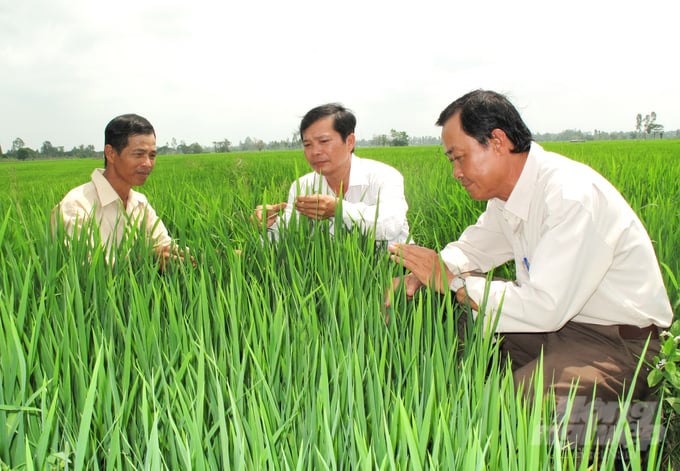
Community agricultural extension teams are the core force in transferring technology and new knowledge to farmers. Photo: Le Hoang Vu.
At present, climate change and the growing demand for environmentally friendly agricultural products are becoming increasingly significant. In this context, An Giang has been actively engaging in the project. This initiative is crucial for enhancing both the productivity and quality of agricultural products.
Moreover, the project not only aims to improve the income of farmers but also to minimize greenhouse gas emissions, thus contributing to sustainable development. Within this framework, community agricultural extension teams play a central role, taking on numerous important tasks to ensure the successful implementation of the project's goals.
Ms. Huynh Dao Nguyen, Director of the An Giang Agricultural Extension Center, stated that An Giang has currently established 129 community agricultural extension teams with 1.601 members. Each team has a minimum of 5 members and is led by the deputy chairperson of the local People's Committee.
Community agricultural extension teams are equipped with a variety of essential professional skills to support local farmers and cooperatives. These skills include guiding the establishment of cooperatives and enhancing the capacities of existing cooperatives to ensure they operate effectively and sustainably. The teams also provide technical advice to both farmers and cooperatives, as well as implement digital transformation in agriculture, enabling farmers to leverage technology to improve productivity and efficiency.
Moreover, community agricultural extension teams continuously update themselves on scientific and technological advancements, as well as production standards required by the market, helping farmers meet consumer demands and regulatory requirements. Finally, they play a crucial role in understanding and implementing policies aimed at linking agricultural product consumption, facilitating better market access for local producers.
In particular, community agricultural extension teams play a crucial role in the 1 Million hectare high-quality rice cultivation project. They are responsible for organizing awareness campaigns to ensure that cooperatives, farmers' groups, and local residents fully understand the necessity, importance, objectives, and significance of the project.
These teams actively promote and encourage farmers to participate in cooperatives and groups. They also organize activities to transfer technical processes and technologies, implement pilot models, and monitor the performance of cooperatives, ensuring that farmers adhere to established procedures. This includes conducting measurements and reporting on Monitoring, Reporting, and Verification (MRV) activities.
Additionally, community agricultural extension teams serve as a vital link between farmers, cooperatives, and businesses, facilitating connections that can enhance market access and opportunities for collaboration.
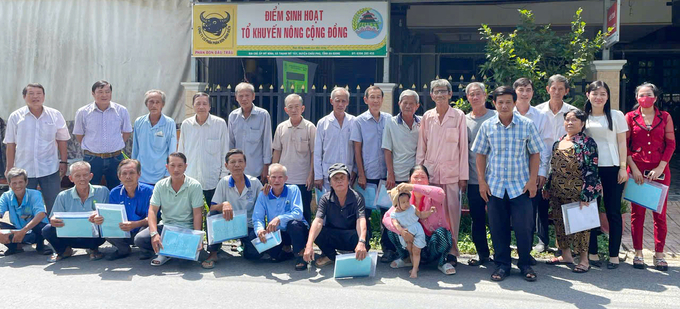
The meeting point for the community agricultural extension team in Thanh My Tay Commune, Chau Phu District, An Giang Province. Photo: Le Hoang Vu.
According to Dr. Nguyen Hong Tin from the Mekong Delta Development Research Institute (Can Tho University), the establishment of community agricultural extension teams in the Mekong Delta provinces serves as a solid support system that empowers farmers to feel more confident in agricultural production. Particularly in the context of the 1 million hectare rice project, the role of these teams is even more significant, as they help farmers enhance their knowledge of sustainable rice production and strengthen connections among farmers within cooperatives and groups.
Additionally, these teams assist farmers in reducing production costs by applying new scientific and technological advancements in their farming practices, ultimately increasing their profitability.
Mr. Nguyen Xuan Vu, the leader of the community agricultural extension team in Vinh Binh Town, Chau Thanh District (An Giang Province), emphasized: “We always strive to provide farmers with the latest scientific advancements and help them understand the importance of producing rice while protecting the environment. When farmers realize the benefits of adopting new techniques, they will be more proactive in participating in sustainable smart rice cultivation programs, which not only reduces production costs but also increases their profits”.
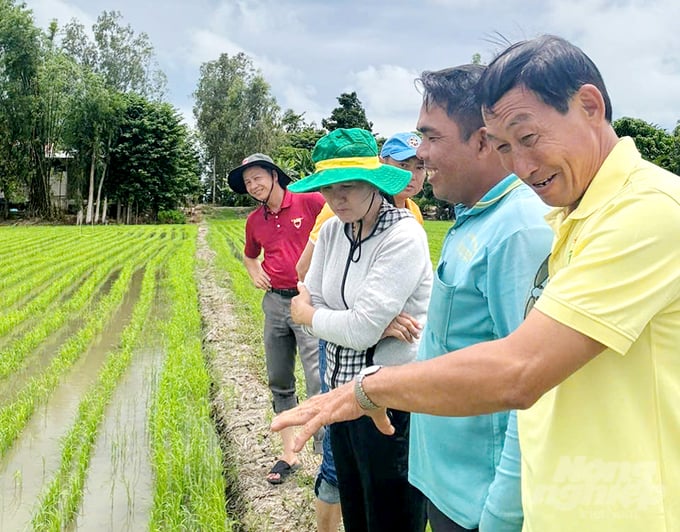
Currently, An Giang has established 129 community agricultural extension teams with 1,601 members. Photo: Le Hoang Vu.
Mr. Tran Thanh Hiep, Deputy Director of the An Giang Department of Agriculture and Rural Development, emphasized that in the face of climate change and the growing demand for environmentally friendly agricultural products, An Giang has been actively participating in the 1 million hectare high-quality rice project. In this initiative, community agricultural extension teams play a vital role, taking on numerous important responsibilities to ensure the successful achievement of the project’s objectives.
"The community agricultural extension teams are the cornerstone of technology transfer and the dissemination of new knowledge to farmers. Their role extends beyond simply instructing farmers on technical aspects; they act as supportive partners, motivating local residents to participate in sustainable production models. This engagement not only helps to protect the environment but also fosters the development of a modern agricultural sector
In An Giang, community agricultural extension teams play a multifaceted role that extends beyond simply imparting knowledge about rice cultivation techniques. They actively collaborate with various government agencies to implement a range of support programs aimed at enhancing agricultural productivity. This collaboration includes providing valuable market advice to farmers, helping them understand market trends and consumer demands, and facilitating access to funding sources that are crucial for their agricultural activities. This helps farmers not only improve their farming methods but also increase their income significantly. This holistic approach contributes to ensuring that agricultural development in the province remains stable and sustainable", said Mr. Tran Thanh Hiep, Deputy Director of the An Giang Department of Agriculture and Rural Development.
Translated by Phuong Linh
![Reducing emissions from rice fields: [3] New values generated from carbon credit](https://t.ex-cdn.com/nongnghiepmoitruong.vn/608w/files/content/2025/05/19/dsc09613-144700_71-150957.jpg)
(VAN) In addition to helping safeguard the environment, the low-emission rice cultivation model also generates new opportunities for farmers by leveraging the carbon credit market.
![Ho Chi Minh city adapts to climate change: [1] Vulnerable in the whirlwind of development](https://t.ex-cdn.com/nongnghiepmoitruong.vn/608w/files/duyenht92/2025/05/19/3131-ngap-nongnghiep-163121.jpg)
(VAN) As the country's economic engine with a rapid urbanization rate, Ho Chi Minh city is facing increasingly serious consequences of climate change.
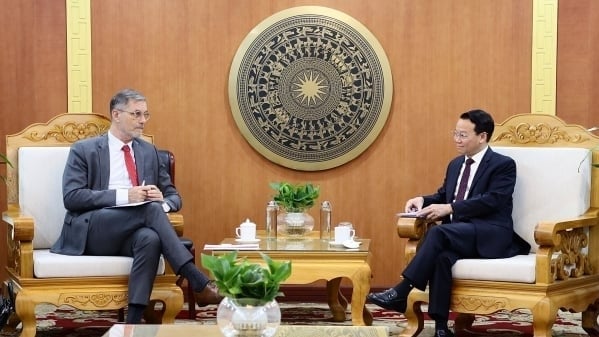
(VAN) On May 21, Minister of Agriculture and Environment Do Duc Duy worked with Mr. Olivier Brochet, Ambassador Extraordinary and Plenipotentiary of the French Republic to Vietnam.
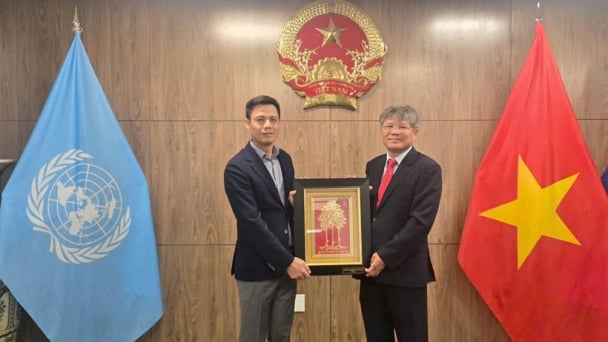
(VAN) VRG recently conducted a visit and working trip to the United States to demonstrate its efforts in redefining the role of rubber enterprises in the global value chain.

(VAN) In 2024, over 295 million people across 53 countries and territories faced acute hunger—an increase of almost 14 million people compared to 2023, while the number of people facing catastrophic levels of hunger reached a record high.

(VAN) World Environment Day 2025 (June 5) carries the theme 'Beat Plastic Pollution' continuing to emphasize the global urgency of addressing the plastic waste crisis.

(VAN) This was the assessment shared by experts at the workshop titled 'Assessing the Role and Potential of Low-Emission Rice Production Systems in Vietnam,' held on the morning of May 19.